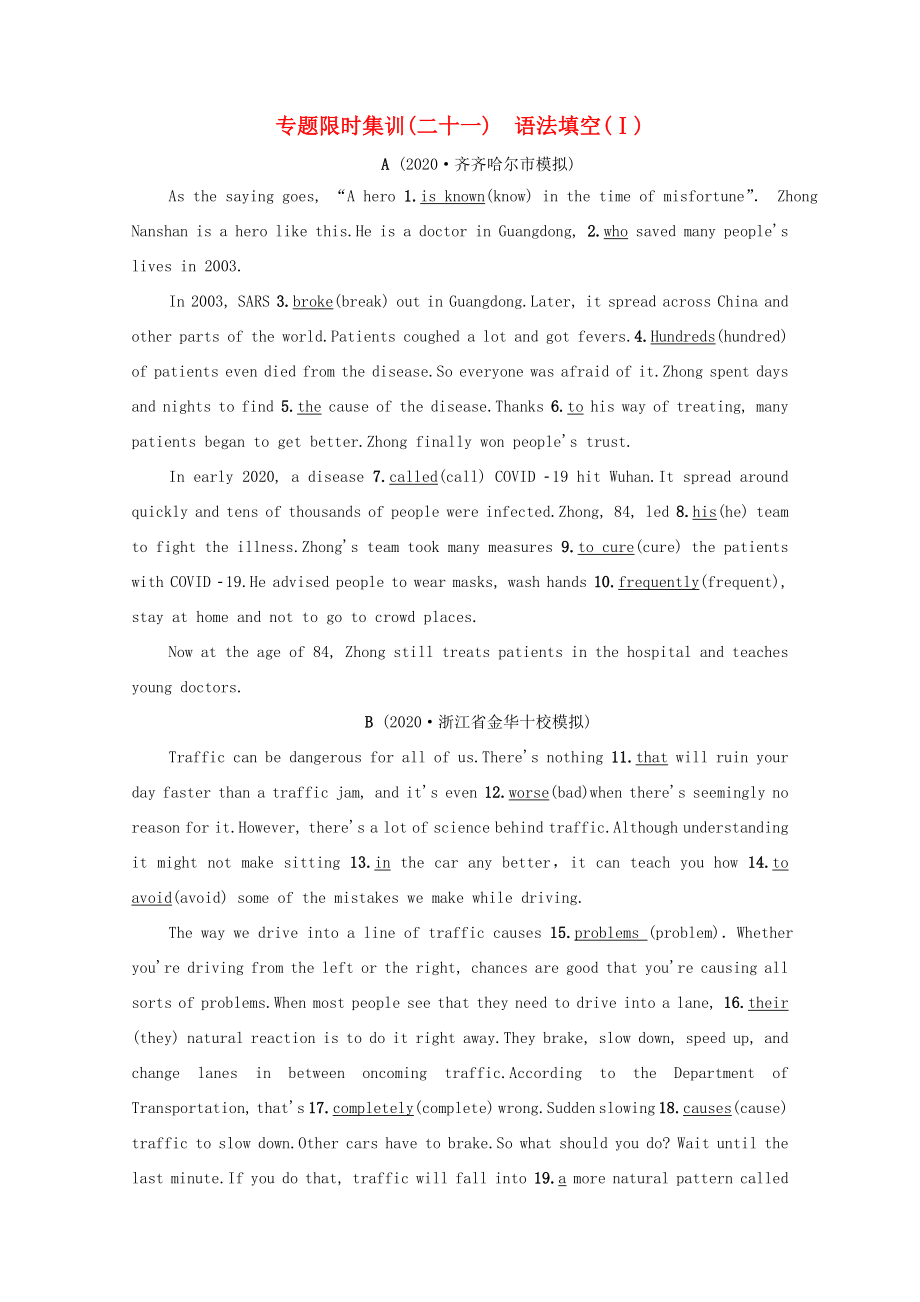《新高考英語二輪復(fù)習(xí) 專題限時(shí)集訓(xùn)21 語法填空(Ⅰ)(含解析)-人教版高三英語試題》由會員分享�,可在線閱讀��,更多相關(guān)《新高考英語二輪復(fù)習(xí) 專題限時(shí)集訓(xùn)21 語法填空(Ⅰ)(含解析)-人教版高三英語試題(3頁珍藏版)》請?jiān)谘b配圖網(wǎng)上搜索�����。
1�����、專題限時(shí)集訓(xùn)(二十一) 語法填空(Ⅰ)
A (2020·齊齊哈爾市模擬)
As the saying goes, “A hero 1.is known(know) in the time of misfortune”. Zhong Nanshan is a hero like this.He is a doctor in Guangdong, 2.who saved many people's lives in 2003.
In 2003, SARS 3.broke(break) out in Guangdong.Later, it spread across China and oth
2����、er parts of the world.Patients coughed a lot and got fevers.4.Hundreds(hundred) of patients even died from the disease.So everyone was afraid of it.Zhong spent days and nights to find 5.the cause of the disease.Thanks 6.to his way of treating, many patients began to get better.Zhong finally won peop
3、le's trust.
In early 2020, a disease 7.called(call) COVID -19 hit Wuhan.It spread around quickly and tens of thousands of people were infected.Zhong, 84, led 8.his(he) team to fight the illness.Zhong's team took many measures 9.to cure(cure) the patients with COVID -19.He advised people to wear mas
4����、ks, wash hands 10.frequently(frequent), stay at home and not to go to crowd places.
Now at the age of 84, Zhong still treats patients in the hospital and teaches young doctors.
B (2020·浙江省金華十校模擬)
Traffic can be dangerous for all of us.There's nothing 11.that will ruin your day faster than a traff
5���、ic jam, and it's even 12.worse(bad)when there's seemingly no reason for it.However, there's a lot of science behind traffic.Although understanding it might not make sitting 13.in the car any better,it can teach you how 14.to avoid(avoid) some of the mistakes we make while driving.
The way we drive
6�����、into a line of traffic causes 15.problems (problem).Whether you're driving from the left or the right, chances are good that you're causing all sorts of problems.When most people see that they need to drive into a lane, 16.their (they) natural reaction is to do it right away.They brake, slow down, s
7�、peed up, and change lanes in between oncoming traffic.According to the Department of Transportation, that's pletely(complete) wrong.Sudden slowing 18.causes(cause) traffic to slow down.Other cars have to brake.So what should you do? Wait until the last minute.If you do that, traffic will fall into 1
8、9.a more natural pattern called a “zipper merge”���, 20.meaning (mean)there are no surprises, no sudden braking, and a smoother transition from one lane to another.
C (2020·山東省實(shí)驗(yàn)中學(xué)診斷性測試)
Sun Bear
Though small, they can be very aggressive, so if you see one, don't mistake it 21.for a soft lovely tedd
9�、y bear! The sun bear lives in trees����,22.so you'll need to keep your eyes on the tree if you want to see one and you can only see them in the rain forests in Southeast Asia.
They are essential to our ecosystem because they help spread seeds while also keeping disgusting termites(白蟻) under control, wh
10、ich means there is less 23.destroying (destroy)of our tropical trees which in turn 24.means(mean)our atmosphere is clean enough for us to live 25.healthily (healthy).
When they do come down from the trees, they also dig for invertebrates(無脊椎動物) in the soil, 26.improving(improve)the forest's nutrien
11���、t cycle by mixing the rich and poor soil.Unfortunately, their global population 27.has declined(decline) 30% over the last few years, making them the second 28.rarest(rare) bear species next to the Giant Panda.
Their tongues are up to 25 cm in 29.length(long)and help them to satisfy their greedy ap
12��、petite for honey, 30.which sometimes makes them known as “honey bears”.You can tell the Sun Bear apart from other bear species from the horseshoe marks on their chest.No two markings are the same!
D (2020·衡陽市聯(lián)考)
Traditionally, we Chinese attach great importance to our home and are often 31.unwilli
13��、ng(willing) to migrate to other places.However, in present times, in particular after the reform and opening-up policy was introduced, more and more people fancy 32.settling(settle) down in more developed cities, just as my family members did.
My parents were both born in Sichuan.In 1963, a time wh
14���、en 33.graduates (graduate) were assigned(分配) jobs by the government, my father received a job in Beijing.After I was born in 1969, my parents went to work in Xinjiang.
In the 1980s, Chinese society 34.was filled(fill) with hope, and people worked hard to achieve their dreams.So did my family.In 198
15��、8, admitted 35.to/into Renming University of China, I went to Beijing.It took me 72 hours by train 36.to travel(travel) from Xinjiang to Beijing, with 37.a distance of over 3, 770 kilometers.In 1990, my brother also passed the entrance examination and was enrolled in a university in Guangzhou, 38.wh
16���、ere he now lives and works.
Recalling the changes over the past four decades, I think 39.improved(improve) transportation is very important to our family.The long distance kept us apart most of the time.Today, the speed and methods of transportation have been improved a lot, which has 40.entirely(entire) transformed our life and can bring us together easily.
 新高考英語二輪復(fù)習(xí) 專題限時(shí)集訓(xùn)21 語法填空(Ⅰ)(含解析)-人教版高三英語試題
新高考英語二輪復(fù)習(xí) 專題限時(shí)集訓(xùn)21 語法填空(Ⅰ)(含解析)-人教版高三英語試題

